

Everytime or Every Time? BBC Learning English - Course: English In A Minute / Unit 1 / Session 88 / Activity 1. BBC Learning English - Course: English In A Minute / Unit 1 / Session 88 / Activity 1. How to Spell. Spelling & Vocabulary Website: SpellingCity. Terms that are Commonly Misspelled in Technical Writing. 21 tips for spelling like the pros. Dictionary of the British English Spelling System - Open Book Publishers. This book will tell all you need to know about British English spelling.
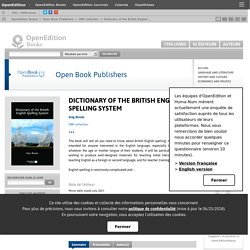
It's a referente work intended for anyone interested in the English language, especially those who teach it, whatever the age or mother tongue of their students. It will be particularly useful to those wishing to produce well-designed materials for teaching initial literacy via phonics, for teaching English as a foreign or second language, and for teacher training. English spelling is notoriously complicated and difficult to learn; it is correctly described as much less regular and predictable than any other alphabetic orthography.
Spelling - Writing Center. The smallest single element in the English language is the letter.
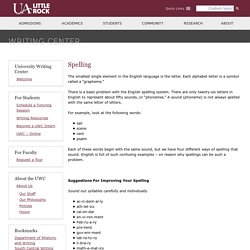
Each alphabet letter is a symbol called a “grapheme.” There is a basic problem with the English spelling system. There are only twenty-six letters in English to represent about fifty sounds, or “phonemes.” A sound (phoneme) is not always spelled with the same letter of letters. For example, look at the following words:
Macmillan Learning. 5 Most Important Spelling Rules. En17suff l1 quiz. En17suff e3 quiz. En16plur e1and2 quiz. En17suff l1 quiz. En17suff e3 quiz. En18root e3 quiz. En18root e1and2 quiz. En19patt l1 f choose the right ending. En19patt e3 f syllables. En19patt e3 w spellling with syllables. En19patt e3 w is it a c or an s. En20memo e3 quiz. When Jumble Fumbles. Year-End Quiz. Forty or Fourty? How to Spell 40.
Singe (verb) definition and synonyms. Spelling. Common misspellings. Here’s a quick-reference guide to the top misspellings according to the Oxford English Corpus – an electronic collection of over 2 billion words of real English that helps us to see how people are using the language and also shows us the mistakes that are most often made.
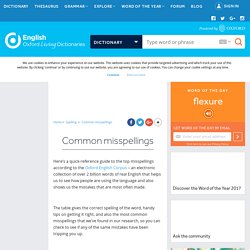
The table gives the correct spelling of the word, handy tips on getting it right, and also the most common misspellings that we’ve found in our research, so you can check to see if any of the same mistakes have been tripping you up.
Adding endings to words that end in -y. When adding endings to words that end with a consonant plus -y, change the final y to i (unless the ending in question, such as -ish, already begins with an i).
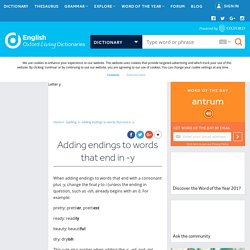
For example: pretty: prettier, prettiest. Dictionary of the British English Spelling System - 4. How do you know when to write a consonant letter double? - Open Book Publishers. 1For some people one of the main bugbears of English spelling is remembering to write, for example, accommodation not *accommodation occurred not *occured. 2In a national survey of adults’ spelling in England and Wales in 1995 using just 15 words, accommodation produced the most errors; 68% of the people in the survey got it wrong (see Basic Skills Agency, 1996). 3Doubled consonant letters are a bugbear even though the doubled consonant spelling with the highest frequency for its phoneme is <ll> at only 18% of occurrences of /l/, and most other doubled consonant spellings are much less frequent.
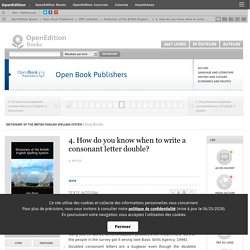
So in this chapter I provide some guidance on this – but be warned: the guidance does not and can not cover every word, so I end up saying ‘The rest you just have to remember, or check in a dictionary’. 4.1.1 Consonant letters are never doubled at the beginning of a word 4Well, hardly ever. Spelling. Year-End Quiz Posted on Tuesday, January 8, 2019, at 11:00 pm Another year of grammatical exploration has concluded with linguistic miles behind us.
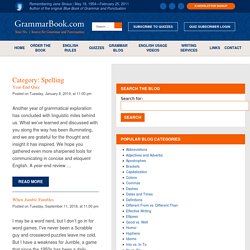
What we’ve learned and discussed with you along the way has been illuminating, and we are grateful for the thought and insight it has inspired. We hope you gathered even more sharpened tools for communicating in concise and eloquent English. When do you double the consonant at the end of a verb, before adding –ed or –ing? When do you double the consonant at the end of a verb, before adding –ed or –ing?
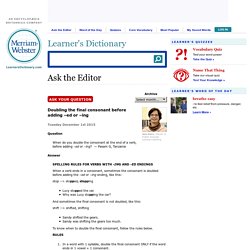
— Pasam G, Tanzania When a verb ends in a consonant, sometimes the consonant is doubled before adding the –ed or –ing ending, like this: stop --> stopped, stopping Lucy stopped the car.Why was Lucy stopping the car? And sometimes the final consonant is not doubled, like this: shift --> shifted, shifting. Search. English names. Spelling: ch and sh. ‘i’ before ‘e’ rule. Spelling the /k/ sound. Place in the UK. Spelling the ‘sh’ sound. Common spelling mistakes. Countries. Free time. Spelling Lessons. Most of the lessons include a video & exercise — click on the links below.You can download the videos and put them on your computer, mobile device from vimeo.com - click here Guest LessonsTop 10 Online Editing Tools to Craft a Perfect Paper (and any writing!)
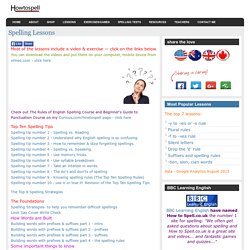
By Antonio TooleyWriting Numbers by Lucy AdamsWays to Organize your Workspace (infographic) by Emily Johnson Useful Spelling and Writing Apps by Sally Sonderson 10 Free Resources for Improving Your Grammar and Writing Skills by Maria Castle13 Useful Tools to Improve Your Writing by Lesley VosDo you Make These Common Mistakes in English? Click here for some worksheets to print off. Contractions. Vocabulary and spelling. ‘i’ before ‘e’ rule. Missing Thai boys found in cave. Spelling tip of the week – grateful.
In this weekly post, we bring more useful content from the Macmillan Dictionary to English language learners.
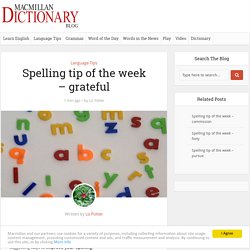
In this series of spelling tips we will be looking at some of the most commonly misspelled words in English and suggesting ways to improve your spelling. People who are trying to look up the adjective grateful in Macmillan Dictionary often search for *greatful instead. In this series we have often looked to frequency as a reason for a certain misspelling, and it is illuminating to do this for grateful. There are 13 entries in Macmillan Dictionary that begin with grat- , most of them like grateful deriving ultimately from the Latin ‘gratus’ meaning ‘pleasing’ or ‘thankful’. Only eight entries start with great, and four of these are for great itself in different parts of speech. An easy way to remember how to spell grateful is to remember that its related noun is gratitude, so no ‘e’ in the first syllable. Verb + preposition + gerund. Reading from Scratch - Spelling Rules. ENGLISH SPELLING RULES Short and Long Vowels 1.
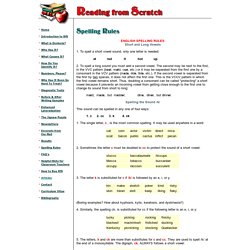
To spell a short vowel sound, only one letter is needed: at red it hot up 2. To spell a long sound you must add a second vowel. Language quizzes on animals, trending words and our Open Dictionary. Language quizzes on animals, trending words and our Open Dictionary. Language quizzes on animals, trending words and our Open Dictionary. Common misspellings. Spelling. Spelling guide. Spelling tip of the week – aggressive. In this weekly post, we bring more useful content from the Macmillan Dictionary to English language learners. BBC Learning English - Course: intermediate / Unit 19 / Session 1 / Activity 3. BBC Learning English - Course: intermediate / Unit 19 / Session 1 / Activity 2. BBC Learning English - Course: intermediate / Unit 19 / Session 1 / Activity 1. Forming comparative and superlative modifiers.
Skillswise - Spelling. OUP Companion web site:Top 10 Spelling Tips. Although there are some words, such as necessary and rhythm, where you just have to learn the spelling, many other words follow special rules. Here are ten easy-to-remember tips to help you to brush up your spelling. You'll find more detailed advice and extra spelling rules in the dictionary's centre section, or you can read our lists of common spelling errors or commonly confused words. You could also test yourself with this quick quiz. 1.
Changing endings of nouns to make plurals Although most nouns form their plurals by simply adding -s to the end (room, rooms), some form their plurals by changing their endings. TIP: the main nouns that change their endings to form their plurals are: OUP Companion web site:Test Your Spelling.
The Flatmates - Quiz 8. The Flatmates - Quiz 142. The Flatmates - Quiz 179. The Flatmates - Language Point 180. Spelling - English Grammar Today - Cambridge Dictionary. There are rules for the plurals of regular nouns and the -s forms of regular verbs. The general rule is add -s: Add '-s' or '-es' or '-ies' Spell It: Weekly Challenge. Login or Register Hello, SAVED WORDS view recents Spell It 10 quick questions: hear them, spell them, and see how your skills compare to the crowd. 100 Words Almost Everyone Mixes Up or Mangles. At one time or another we’ve all suffered the embarrassment of having our remarks corrected by a family member, friend, colleague, or stranger. 100 Words Almost Everyone Mixes Up or Mangles presents fifty pairs of words that people have trouble getting right and keeping straight — words that tend to get corrected when we’re least expecting it. These words include near-synonyms, which are words with subtle but important distinctions in meaning, like baleful and baneful, and effectual and efficacious.
Other pairings bring together notorious sound-alikes, like faze (bother) and phase (stage), pour (put in fluid) and pore (read closely), and waive (forgo) and wave (say hello). 100 Words Almost Everyone Mixes Up or Mangles also addresses some classic spelling blunders and “nonwords” that are often overlooked but should be treated with suspicion, such as beyond the pail, free reign, injust, and run the gambit. Participle Adjectives: '-ed' vs '-ing' Grammarly Blog. What is a contraction? A contraction is a shortened form of a word (or group of words) that omits certain letters or sounds. In most contractions, an apostrophe represents the missing letters. The most common contractions are made up of verbs, auxiliaries, or modals attached to other words: He would=He’d.
I have=I’ve. Oxford Dictionaries.